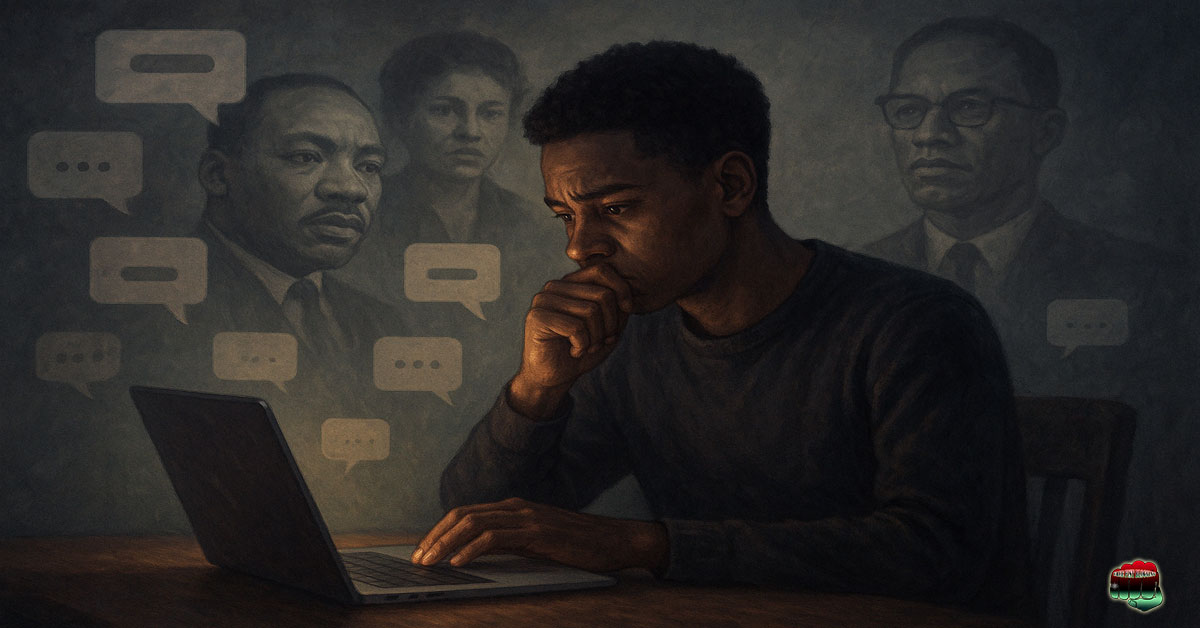By Eliot Mercer, Intelligence Desk
Fear, Silence, and the Lost Conversation on Race
The Weight of Social Media Scrutiny
Scrolling through social media lately, I notice a pattern that unsettles me. Black voices, even when trying to speak candidly about race, often tiptoe, wary of judgment, wary of backlash. The careful choreography of words, the self-censorship, the hesitation—it is everywhere. And it frustrates me. Deeply.
It’s not anger at individuals; it’s a recognition of a generational tension and societal pattern. Many millennials and Gen X-ers who grew up after the Civil Rights marches are navigating a landscape profoundly different from that of their parents. The parents, grandparents, and even great-grandparents faced explicit segregation, systemic oppression, and overt hostility. They risked their lives, their livelihoods, and their communities to demand justice. They understood, viscerally, the cost of silence—and the power of speaking truth to authority.
Historical Gaps and Generational Tensions
Today, however, many younger Black Americans are communicating under a different kind of scrutiny. Social media is a minefield. Every post, every comment, can be dissected, criticized, or misinterpreted. There’s an acute awareness of how white audiences, sometimes friends, sometimes strangers, will react. And so many choose caution over candor, silence over discussion.
This is compounded by a lack of historical knowledge. Many in younger generations do not want to—or feel they do not need to—dig into the struggles of the past. They see the victories of their parents’ generation as distant, almost abstract. Meanwhile, political movements with overtly bigoted ideologies often inherit their views intergenerationally. They grow up steeped in a worldview that tolerates, or even celebrates, racial prejudice.
Speaking Despite Fear
The question is not simply why there is fear, but how we navigate it. How can younger Black voices speak truthfully about race, history, and social justice without being paralyzed by potential misjudgment? How can society at large, particularly those who have never experienced systemic discrimination firsthand, listen without judgment or dismissal?
Ultimately, social media should not be a space where fear dictates the boundaries of conversation. Honest dialogue about race must be encouraged, supported, and contextualized. It must honor history while confronting present realities. And it must allow younger generations to engage, learn, and speak without the constant weight of perceived judgment.
For too long, silence has been the path of least resistance. But the cost of silence is steep: disengagement, misunderstanding, and the perpetuation of inequality. Perhaps the first step is simple: speaking anyway. Thoughtfully. Courageously. Informed by history. Acknowledging fear, but refusing to let it fully silence the truth.
Support InnerKwest: Powering Truth & Excellence with Bitcoin
At InnerKwest.com, we are committed to delivering impactful journalism, deep insights, and fearless social commentary. Your Bitcoin contributions help us execute with excellence, ensuring we remain independent and continue to amplify voices that matter.
Support our mission—send BTC today!
🔗 Bitcoin Address: 3NM7AAdxxaJ7jUhZ2nyfgcheWkrquvCzRm© 2025 InnerKwest®. All Rights Reserved.
InnerKwest® is a registered trademark of RedaJames Inc.
No part of this publication may be reproduced, distributed, or transmitted in any form or by any means without prior written permission. Unauthorized use is strictly prohibited.
Thank you for standing with us in pursuit of truth and progress!![]()


